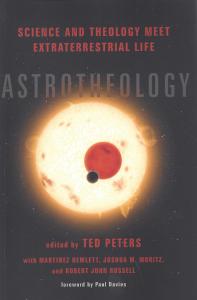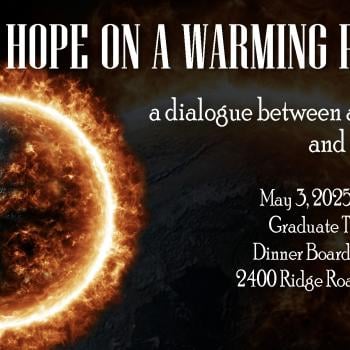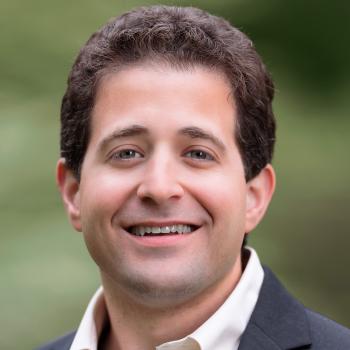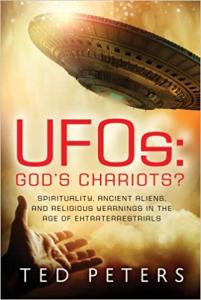 Would confirmation of extraterrestrial intelligent life cause a crisis for terrestrial religion?
Would confirmation of extraterrestrial intelligent life cause a crisis for terrestrial religion?
SR 1165
If ET would knock on your front door and invite you to an alien ‘n’ earthling barbecue, would your religious beliefs face a crisis? Would the world’s religions collapse? My tentative answer is: No! If anything, your appreciation for the magnificence of God’s cosmos would grow.
Why might a public theologian be interested in the UFO phenomenon? For three reasons. First, UFOs are public. They’re experienced everywhere by all sorts of people. Second, like a leaking oil pipeline flooding us with crude, UFOs shower us with religious symbolism. Third, in the form of UAP (Unidentified Aerospace Phenomena), flying saucers are back in the news in religion, academia and government. [See: “Astrotheology’s Contribution to Public Theology“]
Parliament of the World’s Religions
This past October 17, 2021, the Parliament of the World’s Religions sponsored a workshop, “The Enormous Impact of Extraterrestrial Contact.” Veteran ufologists–Mark Rodeghier, Jerome Clark, David Cherniak, and myself–made up the panel. This event featured a new documentary produced for the Canadian Broadcast Corporation by David Cherniak, “UFOs: The Secret History.” This is an accurate account well worth watching.
ETI at Harvard? Really?
Yes, singer Demi Lovato is in the news. In the name of political correctness, she complains that the term, “alien,” is derogatory toward ET. As of this date, I’ve not met an extraterrestrial being who has reported being discriminated against.
For half a century and longer, unidentified aerial phenomena have been investigated primarily by good-hearted amateurs. CUFOs (Center for UAP Studies) and MUFON (Mutual UFO Network) have provided us with the real-life X-Files.
What is breaking on the horizon are new organizations—such as the Scientific Coalition for UAP Studies—made up of scientists who plan to bring instrumental measurement to the research. Jensine Andresen and Octavio Chon-Torres are currently editing an anticipated new book, Extraterrestrial Intelligence: Academic and Social Implications. Astroethicists Kelly Smith, Anson Mount, and John Traphagen are launching a new research project, “Space Exploration, Astrobiology, and the Future of Religion.” You can learn UFO history as the US Library of Congress. Academic excitement is shooting across our intellectual sky like a meteor in August.
Harvard astronomer Avi Loeb is making news. He’s obtained funding for high level UAP research called the Galileo Project. This includes investigation into the Extraterrestrial Hypothesis (ETH).
U.S. Government’s Release of UFO/UAP Siting Reports
One June 25, 2021 the Director of National Intelligence, Avril Haines, shared her intelligence regarding UAP (Unidentified Aerial Phenomena) with the U.S. Congress: Preliminary Assessment: Unidentified Aerial Phenomena. This vacuous report holds as much water as a dry Arizona arroyo in August. The report reported that the U.S. government has no intelligence regarding mysterious aerospace objects that are seen by pilots or tracked on radar; craftlike objects that break tree limbs and leave scorched rings in the soil; un-craftlike apparitions of departed loved ones; and uncanny reports of ETI visitors registering worry over the threat of nuclear war on Earth and warning that earthlings are on a path toward ecocide. Imagine a student term paper that says, “I don’t know anything about this particular topic.”
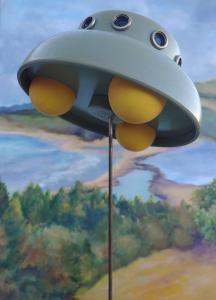
How does America’s chief intelligence officer account for such phenomena? Maybe, the report avers, these UAP could fall into one of “five potential explanatory categories: airborne clutter, natural atmospheric phenomena, USG or U.S. industry developmental programs, foreign adversary systems, and a catchall ‘other’ bin.” Or, maybe “a potential adversary [Russia? China?] has developed either a breakthrough or disruptive technology” (US 2021). Dunno, is the bottom line. Nevertheless, concludes the government report, certainly increased “funding” is called for.
Should Americans sleep soundly each night knowing that their security is in the hands of such intelligent intelligence? No serious attention is given in this report to either the secret technology theory or the extraterrestrial hypothesis (ETH). Let’s turn to the ETH (Peters, Are UFOs Secret Technology or God’s Chariots? 2021).
Asking Different Questions
My response here is not to try to fill this empty report with UFO intelligence. Rather, I’d like to ask a different question: What would be the impact on religious belief systems should we Earthlings wake up one morning and find ourselves keeping company with extraterrestrial neighbors?
Scoffers, journalists, and some scientists bluster that terrestrial religion would collapse under the weight of confirmed knowledge of extraterrestrial intelligence (ETI). Because Christianity and most religious traditions formulated their key beliefs within an ancient worldview now out of date, would shocking new knowledge dislodge our pre-modern dogmas? Are Christians Earth-centric, so that contact with ETI would de-center and marginalize our sense of self-importance? Do our traditional religions rank us human beings on top of life’s hierarchy, so that if we meet ETI who are smarter than us will we lose our superior rank? If we are created in God’s image, will we have to share that divine image with our new space neighbors? In sum, would confirmation of the existence of ETI cause terrestrial belief systems to collapse? And if terrestrial religious belief systems collapse, will theologians find themselves out of a job?
To answer these questions let’s look at some data and then look at some theology. First, the data. With the help of a former student assistant, Julie Froehlig, I conducted The Peters ETI Religious Crisis Survey. That is, I asked people about their faith. That’s a good source for data, isn’t it?
Question 3 of the survey is very informative. Here it is: “Official confirmation of the discovery of a civilization of intelligent beings living on another planet would so undercut my beliefs that my beliefs would face a crisis.” Almost nobody checked Agree or Strongly Agree. More than 90% checked Disagree or Strongly Disagree. This is the case for evangelical Christians, fundamentalist Christians, Roman Catholics, mainline Protestants, and also for Buddhists, Mormons, and the self-identified non-religious. In sum, believers in every religious tradition tested affirm an integration of new knowledge regarding ETI (Peters 2008) (Peters, The Implications of the discovery of extra-terrestrial life for religion 2011).
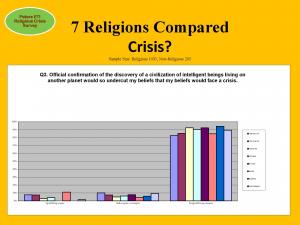
Astrotheogians Speak
Certainly the Dalai Lama rests content with the prospect of stellar visitors. Might we explore this prospect theologically?
Enter: astrotheology. Astrotheology is that branch of theology which provides a critical analysis of the contemporary space sciences combined with an explication of classic doctrines such as creation and Christology for the purpose of constructing a comprehensive and meaningful understanding of our human situation within an astonishingly immense cosmos (Peters, Introducing Astrotheology 2018, 11-12).
Here is an astrotheologian worth paying attention to: David Wilkinson. Wilkinson is an astronomer and Methodist theologian.
Wilkenson does not believe Earth is being visited by aliens piloting flying saucers. Yet, he supports SETI (Search for Extraterrestrial Intelligence) and other work by scientists in hope of meeting new friends living on exoplanets. This is important for Christians, he says, because we need to appreciate how expansive God’s creation really is. “Human beings are not the centre of the universe. In fact, it is the human belief that we are the centre of all things that the Bible calls sin….God is the centre of all things, and we are creatures given status by his love” (Wilkinson 2013, 148). By decentering ourselves on Earth we can appreciate more fittingly our humble place in God’s magnificent cosmos.
But, aren’t aliens sent here by Satan? Those friends of yours who tell you so are very few in number. If they pester you, tell them to buzz off. But of course with “gentleness and respect” (1 Peter 3:15) (Peters, Reasons for the Hope Christians Have 2021).
One Incarnation or Many?
In a future Patheos column, I hope to take up a knotty question: if outer space is populated by races of intelligent beings, would each extraterrestrial civilization warrant its own Christ-like incarnation or would the incarnation in Jesus on Earth suffice for the cosmos? Think up your answer. Then, read a future post on, “One Incarnation or Many?”
▓
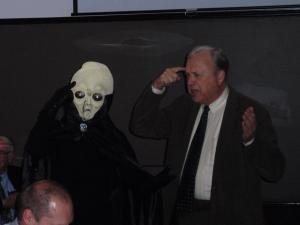 Ted Peters (Ph.D., University of Chicago) directs traffic at the intersection of science, religion, and ethics. Peters is an emeritus professor at the Graduate Theological Union, where he co-edits the journal, Theology and Science, on behalf of the Center for Theology and the Natural Sciences, in Berkeley, California, USA. Along with Martinez Hewlett, Joshua Moritz, and Robert John Russell, he co-edited, Astrotheology: Science and Theology Meet Extraterrestrial Intelligence (2018). Along with Octavio Chon Torres, Joseph Seckbach, and Russell Gordon, he co-edited, Astrobiology: Science, Ethics, and Public Policy (Scrivener 2021). He is also author of UFOs: God’s Chariots? Spirituality, Ancient Aliens, and Religious Yearnings in the Age of Extraterrestrials (Career Press New Page Books, 2014). See his website: TedsTimelyTake.com.
Ted Peters (Ph.D., University of Chicago) directs traffic at the intersection of science, religion, and ethics. Peters is an emeritus professor at the Graduate Theological Union, where he co-edits the journal, Theology and Science, on behalf of the Center for Theology and the Natural Sciences, in Berkeley, California, USA. Along with Martinez Hewlett, Joshua Moritz, and Robert John Russell, he co-edited, Astrotheology: Science and Theology Meet Extraterrestrial Intelligence (2018). Along with Octavio Chon Torres, Joseph Seckbach, and Russell Gordon, he co-edited, Astrobiology: Science, Ethics, and Public Policy (Scrivener 2021). He is also author of UFOs: God’s Chariots? Spirituality, Ancient Aliens, and Religious Yearnings in the Age of Extraterrestrials (Career Press New Page Books, 2014). See his website: TedsTimelyTake.com.
▓
RESOURCES
Peters, Ted. 2021. Are UFOs Secret Technology or God’s Chariots? Online, https://www.patheos.com/blogs/rogereolson/2021/05/guest-post-are-ufos-secret-technology-or-gods-chariots/?utm_medium=email&utm_source=BRSS&utm_campaign=Evangelical&utm_content=259: Roger Olson’s Patheos Blog.
Peters, Ted. 2021. Reasons for the Hope Christians Have. Online, https://www.patheos.com/blogs/rogereolson/2021/06/guest-post-by-ted-peters-reasons-for-the-hope-christians-have/?utm_medium=email&utm_source=BRSS&utm_campaign=Evangelical&utm_content=259: Roger Olson’s Patheos Blog.
Peters, Ted. 2011. “The Implications of the discovery of extra-terrestrial life for religion.” The Royal Society: Philosophical Transactions A 369: 644-655; https://secureservercdn.net/198.71.233.72/kht.6bb.myftpupload.com/wp-content/uploads/2013/03/2011RoyalSoc.pdf.
Peters, Ted. 2008. The Peters ETI Religious Crisis Survey. https://counterbalance.org/etsurv/PetersETISurveyRep.pdf, Seattle: Counterbalance.
Peters, Ted, 2018. “Introducing Astrotheology.” Astrotheology: Science and Theology Meet Extraterrestrial Life, eds., Ted Peters, Martinez Hewlett, Joshua W. Moritz, and Robert John Russell. Eugene OR: Cascade.
US, Office of the Director of National Intelligence. 2021. Preliminary AssessmentL Unidentified Aerial Phenomena. https://www.dni.gov/files/ODNI/documents/assessments/Prelimary-Assessment-UAP-20210625.pdf, Washington DC: US Government Printing Office.
Wilkinson, David. 2013. Science, Religion, and the Search for Extraterrestrial Intelligence. Oxford: Oxford University Press.


